DualSun moves offices to Athens for 15 days – to change scenery, to explore the solar market in Greece, to build a pilot installation, and to experience a unique team-building opportunity… here’s a day-by-day journal of our Hellenic adventure!
Day 1: Saturday, January 31 – Go DualSun!
The entire DualSun team meets at the Paris airport for a 10am flight. Destination? Athens, Greece.
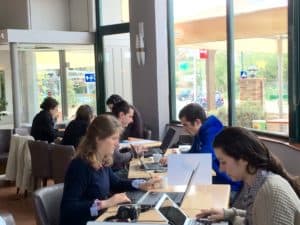
At 3pm, we arrive in “Penteli”, a beautiful hilltop suburb about 20km outside of Athens center, which will become our home and office for the next 14 days. We are warmly welcomed by the family of our Greek colleague who is at the origin of this Greek adventure.
The ground floor of the building is a modern and sunny café, Kath’oti that we will transform into our temporary 2-week DualSun headquarters. On the 2nd floor, we discover 3 big apartments for the team. And we are most excited about the rooftop… where we will build our thermosiphonic pilot installation!
Meeting with a PV-T researcher
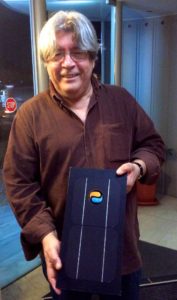
At 5pm, we meet Mr. Yiannis Tripanagnostopoulos (let’s call him Mr. Trip), solar energy researcher and professor at the University of Patras, who has done a lot of research on PV-T (photovoltaic and thermal) solar technologies, like DualSun. We were in touch with Mr. Trip through our co-founder Laetitia Brottier, who had met him at numerous technical conferences. For day one, our meeting with Mr. Trip was the perfect introduction into the Greek solar market.
Greece is a huge market for solar water heating. There are currently 4 million m2 of thermal modules installed in Greece. Considering that you need about 1m2 per person to meet hot water needs and Greece’s population is about 11 million people, that means that almost 40% of the population uses the sun to heat their water! Mr. Trip would like to see 100% of the population covered by solar hot water heating, and maybe with the new government, things could move forward in a positive direction. We’ll see.
Mr. Trip also spoke to us about some interesting research he is conducting on “reflectors”, or ways to reflect solar rays onto solar panels in order to increase efficiency – one idea is to simply paint the ground in front of the panel white!
The 2-hour meeting allowed us to have fascinating discussions about solar and launch our adventure in Greece.
In the evening, we head to Athens center (Monastiraki) for a typical Greek dinner (we love tzatziki!).
Day 2: Sunday February 1st – Athens, we are come!
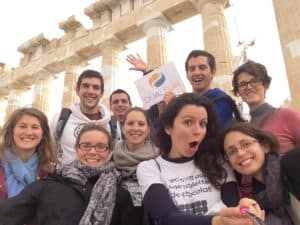
We begin at Syntagma (the Parliament) to witness the incredible weekly parade for the changing of the guard, with music and soldiers dressed in traditional outfits. We then head to the Acropolis museum, passing by the Temple of Zeus. The museum is a splendid introduction to the history of the site, and on the 3rd floor of the museum, we have a nice view of Athens rooftops… the majority which are dotted with thermosiphonic hot water systems!
After a quick gyro snack, we climb up to the world-famous Acropolis, to witness the majestic Parthenon…and take endless group selfies.
At 5pm, we had back down towards the roman Agora passing by the theater of Dionysis, Hadrien’s Library and the Greek Agora… so many amazing archaeological sites to see!
Thermosiphonic installations everywhere you look !
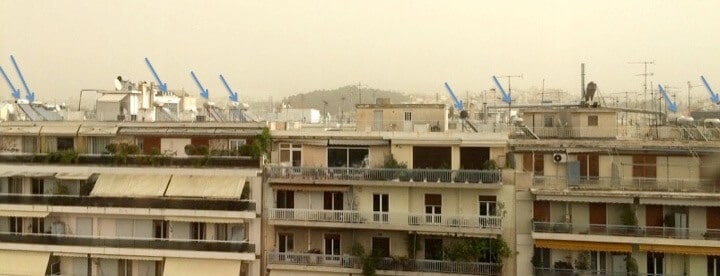
As tourists, we were impressed by the rich cohabitation of ancient and modern society. As solar engineers, we were impressed by the endless number of thermosiphonic solar hot water systems – definitely a very different “roof landscape” from the one we are used to in France.
Day 3: Monday February 2 – the workweek begins in our new Greek office
7:45am: In the land of the first “marathon” the team starts the day with a morning jog, what we like to call the DualRun!
Meeting with a solar installer
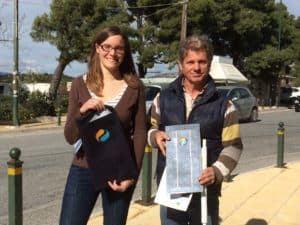
11am: meeting with Mr. Stavros Triantafyllou, a local plumber who has installed many thermosiphonic systems. He will be installing our pilot project and he was excited to discover our innovative hybrid technology.
The workday takes form as per usual, with phone calls, team meetings, and …lots of coffee.
In the evening, we have a low-key board game night with a homemade meal of Greek pasta “chilopites” made by two team members.
Day 4: Tuesday February 3 – go go go!
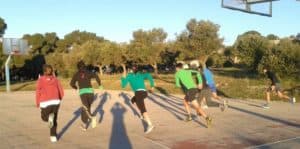
7:45am: we start the day again with team exercising; this time it’s “Dual Bootcamp” with 5 rounds of various exercises, leaving our bodies sore for the days to come…
Throughout the day, we welcome several Greek contacts to our ephemeral offices for more meetings about solar energy and the Greek market.
Meeting with smart grid researchers
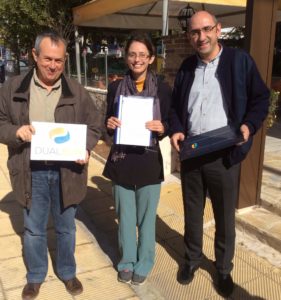
Panagiotis Papageorgas and Georgios Vokas are professors and researchers at the Electronics department of TEI Piraeus. Mr. Vokas became a PV-T expert back in 2004 with several publications on the subject, and Mr. Paparegorgas is working in collaboration with the University of Lorraine on high-voltage switching for renewable energy production.
We are particularly excited to meet the two professors because we have a joint smart-grid project together, “Hybrid System for Residential Energy Farms in Mediterranean Regions” in response to a European call for projects Eranetmed (Morocco, Lebanon, France, Greece).
Mr. Vokas believes that PV-T has a future in Greece: near-term or long-term future? The near-term horizon is looking a bit bleak due to the crisis and the political situation, but with such a sunny climate and solar hot water heating such an integrated part of society, we at DualSun are of course very interested.
Meeting with a solar PV company
Alkis Iliadis is from EnerCo, PV specialist in the Greek and Turkish markets, overseeing large-scale ground solar installations (>1 MW).
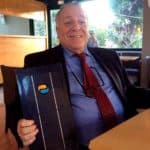
The discussion was focused on the market potential for DualSun in Greece and Turkey. We discussed that due to the crisis and the end of subsidies, PV in Greece is currently “on pause”. However, things could come back to life with new talks of a net-metering scheme.
Mr. Iliadis believes in the DualSun technology, the next step is to test different “business cases” for the market- which is very different from the French market. PV-T does not exist in Greece, people are not very open to “innovation”, especially at this moment.
We discussed our pilot installation, he is very interested to see the results in a couple of months and do a technical and economical feasibility analysis of the system for the Greek market.
Final meeting of the day… with Greek traditional music!
We end the day with a delicious dinner at a nearby restaurant with excellent live rebetiko music.
Day 5: Wednesday February 4 – Concentration and inspiration
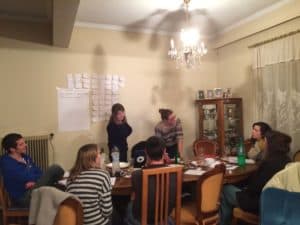
7:45am As Dualbootcamp left us with aching legs and abs, we decided to start the day by opening our chakras with Dualyoga!
Another typical (=intense) day of work filled with solar projects, answering customer’s questions, organizing production, and preparing for the Salon des ENR in March, the largest French renewable energies trade show.
After a small pause at the end of the workday, the team reconvened in the evening for a creativity brainstorming session to discuss marketing and technical support material for our installers: a mobile app? Video tutorials? After two hours of exercises, we came up with dozens of innovative ideas; the next step is to convert the ideas into action!
Day 6: Thursday February 5 – Afterwork drinks… at the temple of Poseidon!
No time for exercise this morning, we start the workday earlier than usual in order to head to beautiful Sounio at the end of the day in time for sunset!
Meeting with Calpak
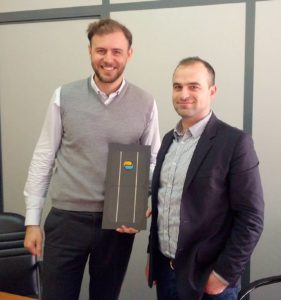
In the morning, Jerome and Alki head to Athens to visit Calpak, Greek manufacturer of thermosiphonic systems. The company was created in the 70s and is currently an international leader in the thermosiphonic market. We met George Xanthopoulos, export manager and Panayis Konstantinidis, CEO to discuss the thermosiphonic market in Greece and internationally. They found our technology extremely innovative. But they also highlighted that radical innovation will be hard to enter the thermosiphonic market, which is extremely competitive and cost-driven. In order to enter the market, our product needs to be ultra simple and competitive. Challenge accepted!
Like many of our contacts, he warned us that it is not the right moment to enter the Greek market, but that we should definitely think about expansion in other growing markets.
Meeting with Poseidon
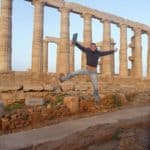
For today’s after-work drinks, we take the 1-hour drive up to Sounio where the Temple of Poseidon lies on a beautiful cliff overlooking the sea. In addition to the magnificent ancient temple that was built in the 5th century BC, the site is known for the legendary story of Aegeus, king of Athens and his son Theseus. Theseus left by boat to fight the mighty Minotaur. The father and son agreed that if Theseus defeated the Minotaur, he would raise a white flag on the boat, and if not, he would leave the black flag. Indeed, Theseus was victorious in his battle against the Minotaur; however on his return, he forgot to change the flag on the ship. When Aigeus saw the boat of his son approaching with a black flag, he was so devastated with grief at the thought of his son’s supposed death, that he jumped into the sea ending his life, thus the “Aegean Sea”.
Day 7: Friday February 6 – Xorevoume (we dance!)
7:45am – This morning, we start the day with an intense game of ultimate Frisbee! The day passes quickly as we finish up the work week, and in the evening we celebrate one of our team member’s birthdays with an unforgettable Greek dancing class, followed by a traditional dinner with more live music and dancing!
Day 8: Saturday, February 7 – Weekend getaway to Peloponnese!
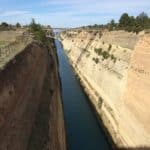
It’s fantastic to work in Greece; it’s also fantastic to visit and explore the country!
We start the day with a stop at the Corinth Canal, and admire the amazing engineering project that was inaugurated in 1893, measuring 6km long and 24m wide. The canal allows ships weighing less than 10,000 tons to avoid a 400km detour around the peninsula.
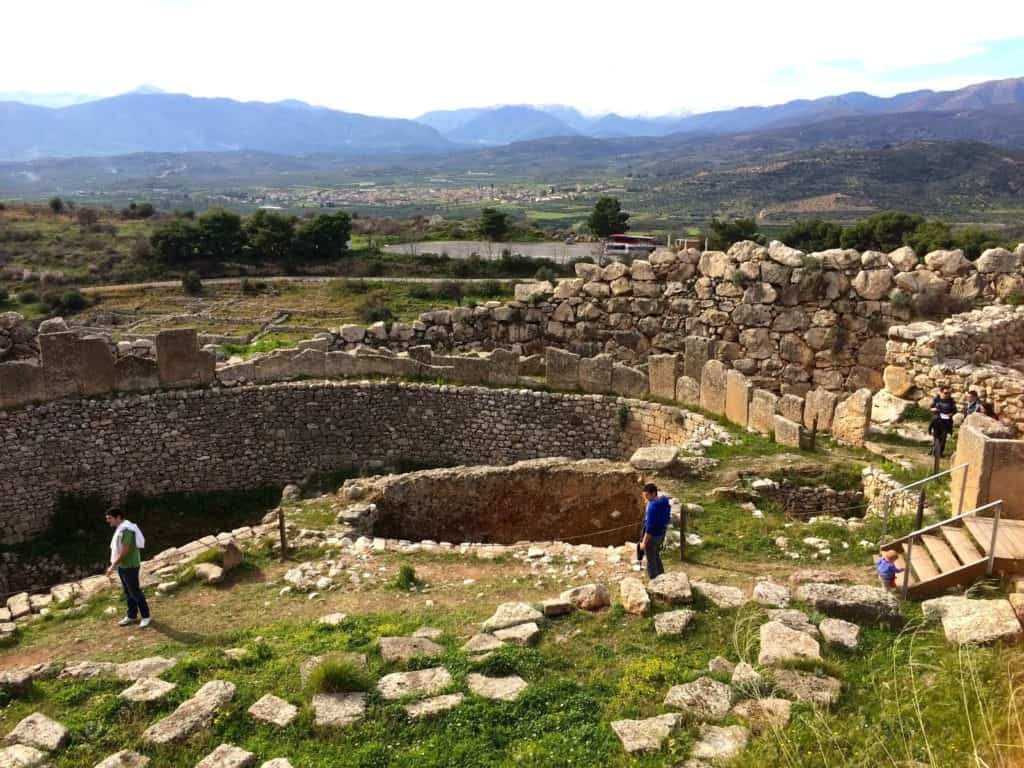
We then head to the beautiful Mycenae, an ancient dominant Mediterranean city at the end of the Bronze Age, from the 15th to 13th centuries BC!
We end the day in the breath-taking port city of Nafplio, the first capital of Modern Greece that was successively occupied by the French, the Venetian and the Turks, each leaving their marks. Before heading out to dinner, three brave team members decide to go for a quick “dip” in the water. As it was dusk and temperatures were quite chilly, they generated quite the crowd of amazed tourists and locals!
Day 9: Sunday February 8 – Improv at the Ancient Theater of Epidaurus

8:30am: We start the day early with a visit to the Palamedes fortress – a fortress that was built in the 18th century by the Venetians and measures 286m in altitude and sits atop Nafplio overlooking the sea.
We then head to the sanctuary of Asclepios which is home to the celebrated Epidaurus theater – as it was still early in the morning, we had the theater all to ourselves for a small while before other tourists started pouring in.
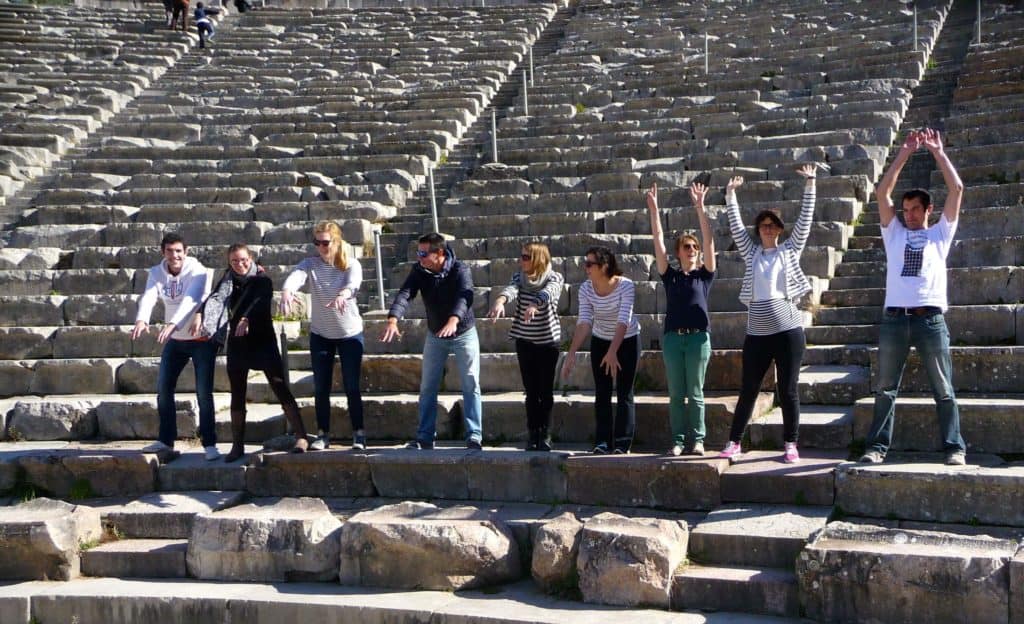
During Antiquity, people came from all over Greece to this area to be treated by Asclepios, the medicinal god. The theater was built in the 4th century B.C. to host the “Asclepeia”, a theater competition in honor of Asclepios. The theater served as a model for many other Greek theaters. Of all ancient theaters, the theater of Epidaurus is the most well-preserved, and in addition to its beauty and engineering, one of the most impressive aspects of this theater is the incredible acoustics.
We then head back to Athens to explore the capital and climb the Philopappos hill for a spectacular view of the Acropolis and the city.
We end the day with a movie recommended by our Greek team member, “My Big Fat Greek Wedding”.
Day 10: Monday February 9 – It’s snowing in Greece?
The second week of work in Greece begins… under the snow! It’s unclear when we will be able to install our thermosiphonic system, but it will definitely have to wait until later in the week.
Day 11: Tuesday February 10 – It’s still snowing
It’s still snowing in Penteli, and we feel like we’re at a ski resort instead of a Mediterranean beach location! Part of the material for the installation arrives: the thermosiphonic tank and the mounting structure.

At lunchtime, we meet with Bruno Chasserieau, a Frenchman who has been living in Greece for the past 10 years and who discovered DualSun recently in a press article, and then “liked” our page on Facebook. When we saw that we were in Greece for 15 days, he immediately contacted us to discuss DualSun’s business potential in Greece. He sees an interesting opportunity for hotels in the islands where the electricity is not as reliable as on the mainland, and contrary to the other people we met, he said that despite the crisis, now is a good time to enter the market! The DualSun team would be more than delighted to do a project on a hotel in the Greek Isles…. Thank you Facebook for this interesting encounter!
The evening was quite memorable as we lost electricity and spent part of the evening in darkness. No electricity, no heating… fortunately the raki that Bruno offered us warmed us in the meantime, thank you Bruno!
Day 12: Wednesday February 11 – It’s… still snowing!
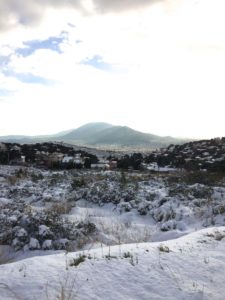
Centimeters of snow accumulated overnight which interrupted our morning jog. We decided to do a Dualbootcamp… indoors!
This unusually cold (and snowy) climate in Greece made us realize something important about heating and insulation: while Greek buildings (or at least the one in which we were staying) q43 not at all designed for cold weather. We had electric heaters in each of the rooms of the apartments, but nonetheless we could feel currents of cold air seeping through the walls, to the point where the rooms would never actually get warm. We’ve said it before and now more than ever we say it again: the first step to energy efficiency and comfort is good insulation.
The 2 DualSun panels arrived without any problem, they will have to wait however until the snow goes away before being installed.
Day 13: Thursday February 12

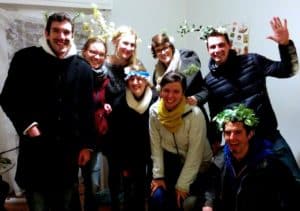
We met again with the installers that will manage our thermosiphonic installation. We presented them the panels and the specificities of the technology. The good news was that they spoke English, the bad news was that the weather was still too cold to install.
Today, Greece celebrates “Tsiknopempti”, a sort of Mardi Gras where people grill and eat meat on the streets. After work, we celebrated Tsiknopempti at Quilombo, a cultural center in the Gazi neighborhood of Athens with an amazing live band and Greek dancing. We got to practice our moves that we learned last week!
Day 14: Friday February 13
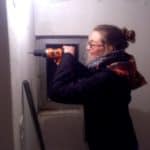
Last day of work in Greece, tomorrow we’re heading back to France! It’s a sunny last day in Greece, the installation moves forward but some parts are missing so sadly, the installation will have to be complete after our departure.

For our last evening, we pay tribute to fine Greek cuisine in all its glory: tzatziki, souvlaki, tiropites (cheese pies), Greek salad, “horta” (Greek greens), marinated mushrooms, grilled eggplant, fried zucchini, stuffed grape leaves, and more… it’s official, the diet starts tomorrow!
We began reflecting on this 2-week adventure, and the feelings are very positive ; the team is motivated to apply this “concept” again in a different country!
Day 15: Saturday February 14
A quick tour to Athens center before taking the plane; we leave with bags full of olive oil, honey, Gree pastries, and of course, Ouzo. Each member takes off separately for the weekend, but we’ll all regroup again on Monday at the office!
Alas, our Greek adventure is over: 15 days 100% DualSun embarking on new horizons: it went by so quickly and the experience was so rich, that we can’t stop here…
Viva DualSun, Go DualSun!
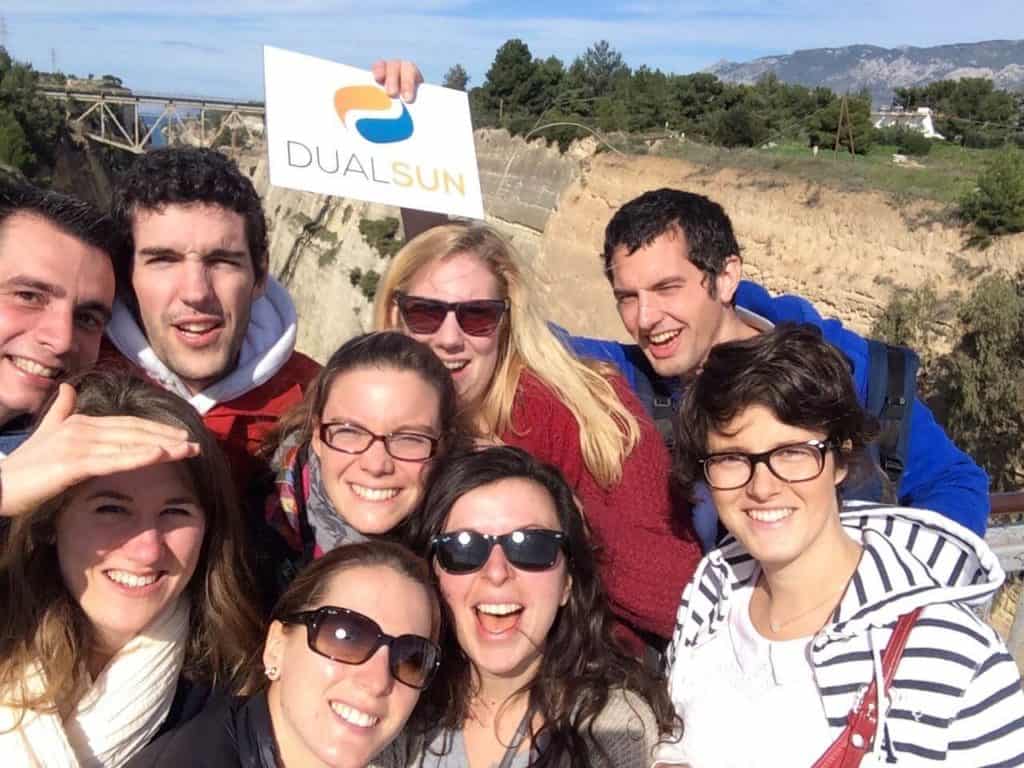
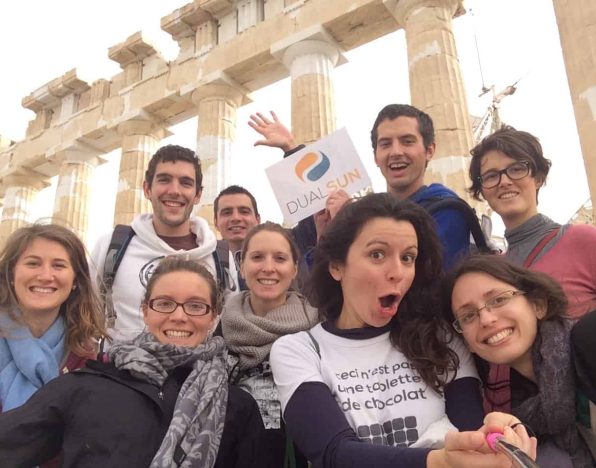
Aucun commentaire pour le moment